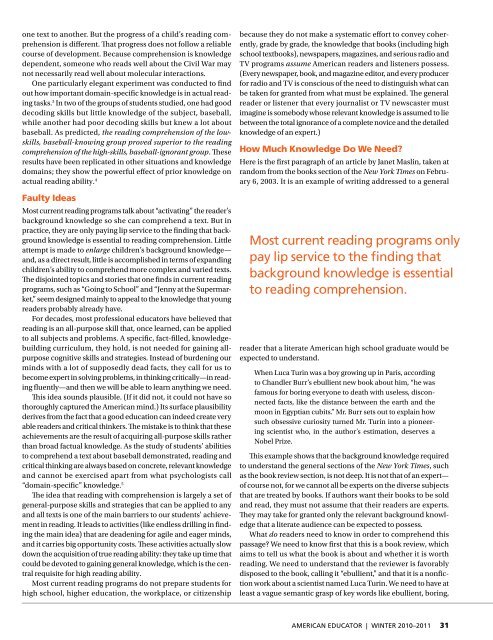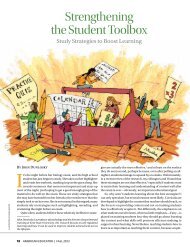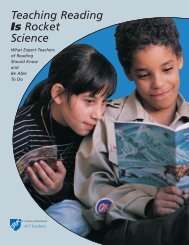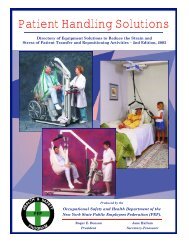American Educator, Winter 2010-11, Vol. 34, No. 4, AFT
American Educator, Winter 2010-11, Vol. 34, No. 4, AFT
American Educator, Winter 2010-11, Vol. 34, No. 4, AFT
You also want an ePaper? Increase the reach of your titles
YUMPU automatically turns print PDFs into web optimized ePapers that Google loves.
one text to another. But the progress of a child’s reading comprehension<br />
is different. That progress does not follow a reliable<br />
course of development. Because comprehension is knowledge<br />
dependent, someone who reads well about the Civil War may<br />
not necessarily read well about molecular interactions.<br />
One particularly elegant experiment was conducted to find<br />
out how important domain-specific knowledge is in actual reading<br />
tasks. 3 In two of the groups of students studied, one had good<br />
decoding skills but little knowledge of the subject, baseball,<br />
while another had poor decoding skills but knew a lot about<br />
baseball. As predicted, the reading comprehension of the lowskills,<br />
baseball-knowing group proved superior to the reading<br />
comprehension of the high-skills, baseball-ignorant group. These<br />
results have been replicated in other situations and knowledge<br />
domains; they show the powerful effect of prior knowledge on<br />
actual reading ability. 4<br />
Faulty Ideas<br />
Most current reading programs talk about “activating” the reader’s<br />
background knowledge so she can comprehend a text. But in<br />
practice, they are only paying lip service to the finding that background<br />
knowledge is essential to reading comprehension. Little<br />
attempt is made to enlarge children’s background knowledge—<br />
and, as a direct result, little is accomplished in terms of expanding<br />
children’s ability to comprehend more complex and varied texts.<br />
The disjointed topics and stories that one finds in current reading<br />
programs, such as “Going to School” and “Jenny at the Supermarket,”<br />
seem designed mainly to appeal to the knowledge that young<br />
readers probably already have.<br />
For decades, most professional educators have believed that<br />
reading is an all-purpose skill that, once learned, can be applied<br />
to all subjects and problems. A specific, fact-filled, knowledgebuilding<br />
curriculum, they hold, is not needed for gaining allpurpose<br />
cognitive skills and strategies. Instead of burdening our<br />
minds with a lot of supposedly dead facts, they call for us to<br />
become expert in solving problems, in thinking critically—in reading<br />
fluently—and then we will be able to learn anything we need.<br />
This idea sounds plausible. (If it did not, it could not have so<br />
thoroughly captured the <strong>American</strong> mind.) Its surface plausibility<br />
derives from the fact that a good education can indeed create very<br />
able readers and critical thinkers. The mistake is to think that these<br />
achievements are the result of acquiring all-purpose skills rather<br />
than broad factual knowledge. As the study of students’ abilities<br />
to comprehend a text about baseball demonstrated, reading and<br />
critical thinking are always based on concrete, relevant knowledge<br />
and cannot be exercised apart from what psychologists call<br />
“domain-specific” knowledge. 5<br />
The idea that reading with comprehension is largely a set of<br />
general-purpose skills and strategies that can be applied to any<br />
and all texts is one of the main barriers to our students’ achievement<br />
in reading. It leads to activities (like endless drilling in finding<br />
the main idea) that are deadening for agile and eager minds,<br />
and it carries big opportunity costs. These activities actually slow<br />
down the acquisition of true reading ability: they take up time that<br />
could be devoted to gaining general knowledge, which is the central<br />
requisite for high reading ability.<br />
Most current reading programs do not prepare students for<br />
high school, higher education, the workplace, or citizenship<br />
because they do not make a systematic effort to convey coherently,<br />
grade by grade, the knowledge that books (including high<br />
school textbooks), newspapers, magazines, and serious radio and<br />
TV programs assume <strong>American</strong> readers and listeners possess.<br />
(Every newspaper, book, and magazine editor, and every producer<br />
for radio and TV is conscious of the need to distinguish what can<br />
be taken for granted from what must be explained. The general<br />
reader or listener that every journalist or TV newscaster must<br />
imagine is somebody whose relevant knowledge is assumed to lie<br />
between the total ignorance of a complete novice and the detailed<br />
knowledge of an expert.)<br />
How Much Knowledge Do We Need?<br />
Here is the first paragraph of an article by Janet Maslin, taken at<br />
random from the books section of the New York Times on February<br />
6, 2003. It is an example of writing addressed to a general<br />
Most current reading programs only<br />
pay lip service to the finding that<br />
background knowledge is essential<br />
to reading comprehension.<br />
reader that a literate <strong>American</strong> high school graduate would be<br />
expected to understand.<br />
When Luca Turin was a boy growing up in Paris, according<br />
to Chandler Burr’s ebullient new book about him, “he was<br />
famous for boring everyone to death with useless, disconnected<br />
facts, like the distance between the earth and the<br />
moon in Egyptian cubits.” Mr. Burr sets out to explain how<br />
such obsessive curiosity turned Mr. Turin into a pioneering<br />
scientist who, in the author’s estimation, deserves a<br />
<strong>No</strong>bel Prize.<br />
This example shows that the background knowledge required<br />
to understand the general sections of the New York Times, such<br />
as the book review section, is not deep. It is not that of an expert—<br />
of course not, for we cannot all be experts on the diverse subjects<br />
that are treated by books. If authors want their books to be sold<br />
and read, they must not assume that their readers are experts.<br />
They may take for granted only the relevant background knowledge<br />
that a literate audience can be expected to possess.<br />
What do readers need to know in order to comprehend this<br />
passage? We need to know first that this is a book review, which<br />
aims to tell us what the book is about and whether it is worth<br />
reading. We need to understand that the reviewer is favorably<br />
disposed to the book, calling it “ebullient,” and that it is a nonfiction<br />
work about a scientist named Luca Turin. We need to have at<br />
least a vague semantic grasp of key words like ebullient, boring,<br />
AMERICAN EDUCATOR | WINTER <strong>2010</strong>–20<strong>11</strong> 31





